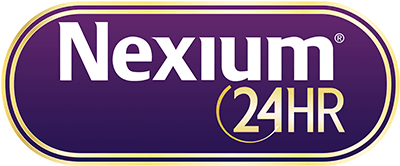HEARTBURN TRIGGERS
Heartburn triggers vary from person to person. Sometimes those triggers are physiological, while for many other people certain foods, drinks, and lifestyle habits may be the catalyst. Below are some tips to help you overcome common heartburn triggers.
Overeating
Avoid overeating with smaller, slower, and more frequent meals throughout the day. Also, avoid late-night snacks.
Smoking
Smoking isn’t just bad for your lungs; it also raises the risk of heartburn.
Sleeping on Your Right Side
According to research, sleeping on your right side may worsen acid reflux. Try sleeping on your left side or raising the head of your bed.
Stress
Stress alone does not cause acid production. However, stress can disturb or slow the digestive process, which can increase your sensitivity to acid and worsen the pain caused by heartburn.
Food Triggers
Food heartburn triggers differ from person to person, but common ones include:
• Rich, spicy, fried, or fatty foods
• Chocolate
• Caffeine
• Carbonated beverages
• Alcohol
• Coffee
• Ketchup and mustard
• Vinegar
• Tomato and citrus juices
• Mints
• Other acidic fruits and juices
Keep tabs on what you eat and learn to avoid the things that cause heartburn.
Tight Clothes
Belts and tight-fitting clothing may be fashionable, but they also put extra pressure on your stomach.
STRESS & HEARTBURN
Stress and heartburn go hand in hand—but perhaps not in the way you think. While stress does not increase the production of stomach acid, it does temporarily slow down the digestive process, keeping food in the stomach longer and giving stomach acids more time to move through the lower esophageal sphincter and up your throat.
Reducing stress may help reduce heartburn symptoms, but be mindful that stress can lead to the adoption of other common heartburn triggers like smoking and overeating. Avoiding other heartburn triggers while you work to minimize stress may also be helpful.
WHAT CAUSES HEARTBURN
Heartburn occurs when stomach acid rises into your esophagus. Normally when you swallow, your Lower Esophageal Sphincter (LES) relaxes, allowing liquid to flow into your stomach, before closing again.
If the LES relaxes abnormally, acid can flow back up into your esophagus and cause heartburn.
1. Esophagus
The muscular tube that connects the mouth and throat to the stomach.
2. Lower Esophageal Sphincter (LES)
A circular band of muscles around the bottom part of your esophagus.
3. Stomach
An internal organ in which some food digestion occurs.
4. Proton Pump
An enzyme that produces acid inside the cells that line the stomach.
5. Diaphragm
A muscle that separates the chest from the abdomen.
Use as directed for 14 days to treat frequent heartburn. Not for immediate relief. Nexium® 24HR may take 1-4 days for full effect.
Nexium® 24HR actually controls my acid reflux better than any other product that I have tried!
-Fishindt





